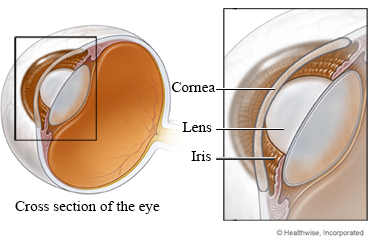
Your Recovery
Photorefractive keratectomy (PRK) is surgery to improve your vision. You can have PRK surgery in one or both eyes. The doctor used special tools to keep your eye open. The cells on the surface of your eye were removed or pulled to one side. Then the doctor used a special laser to remove tissue and reshape the outside layer of your eyeball (cornea). Afterward, the doctor placed a contact lens on your eye as a bandage.
Your eye will hurt, burn, or itch for 3 or 4 days after surgery. Your vision may be blurry, your eyes may water, your nose may run, or you may feel like there is something in your eye. But it is important not to rub your eye. Rubbing your eye could damage it.
Do not remove the contact lens in your eye. The doctor will remove this lens 2 to 4 days after surgery.
At first, your vision may be better. But it may get slightly worse. Sometimes it takes a few weeks to be able to see clearly. But you will probably be able to return to work or your normal routine in about 5 days.
It is common to be sensitive to light or to see starbursts or halos for 1 to 3 weeks. Most people will see well in a few weeks. But for some people, it takes 3 to 6 months to get the full benefits of surgery and to see as clearly as possible.
Your doctor will recommend or prescribe pain medicines. The doctor will also give you eyedrops to prevent infection and to help with dryness. Your eye may feel dry for 1 to 3 months after surgery.
This care sheet gives you a general idea about how long it will take for you to recover. But each person recovers at a different pace. Follow the steps below to get better as quickly as possible.
How can you care for yourself at home?
 Activity
Activity
- Ask your doctor when it is okay to drive.
- Your doctor may advise you to sleep when you get home from surgery. Keeping your eye closed may help your eye heal.
- You can shower or wash your hair the day after surgery. Keep water, soap, shampoo, hair spray, and shaving lotion out of your eye, especially for the first week.
- Do not rub or put pressure on your eye for at least 1 week.
- Ask your doctor when you can wear eye makeup again and get your hair colored.
- Follow your doctor's instructions for when you can exercise and return to contact sports such as boxing or football. You may need to wear eye protection when you return to contact sports.
- For 1 to 2 weeks, avoid swimming, hot tubs, gardening, and dusting.
- Wear sunglasses on bright days for at least 1 year after surgery and avoid too much sun exposure.
 Medicines
Medicines
- Your doctor will tell you if and when you can restart your medicines. The doctor will also give you instructions about taking any new medicines.
- If you stopped taking aspirin or some other blood thinner, your doctor will tell you when to start taking it again.
- Follow your doctor's instructions for when to use eyedrops. Always wash your hands before you put your drops in. To put in eyedrops:
- Tilt your head back, and pull your lower eyelid down with one finger.
- Drop or squirt the medicine inside the lower lid.
- Close your eye for 30 to 60 seconds to let the drops or ointment move around.
- Do not touch the ointment or dropper tip to your eyelashes or any other surface.
- Follow your doctor's instructions for taking pain medicines.
Follow-up care is a key part of your treatment and safety. Be sure to make and go to all appointments, and call your doctor if you are having problems. It's also a good idea to know your test results and keep a list of the medicines you take.
When should you call for help?
Call 911 anytime you think you may need emergency care. For example, call if:
- You passed out (lost consciousness).
- You have a sudden loss of vision.
Call your doctor now or seek immediate medical care if:
- You have signs of an eye infection, such as:
- Pus or thick discharge coming from the eye.
- Redness or swelling around the eye.
- A fever.
- You have new or worse eye pain.
- You have unexpected vision changes.
- Your contact lens falls out.
Watch closely for changes in your health, and be sure to contact your doctor if:
- You do not get better as expected.
Where can you learn more?
Go to http://www.healthwise.net/patientEd
Enter U477 in the search box to learn more about "Photorefractive Keratectomy (PRK): What to Expect at Home".
Current as of: July 31, 2024
Author: Ignite Healthwise, LLC Staff
Clinical Review Board
All Healthwise education is reviewed by a team that includes physicians, nurses, advanced practitioners, registered dieticians, and other healthcare professionals.

